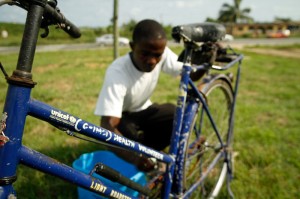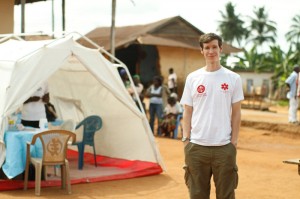Bikes and free clinics
 Akatekyiwa health volunteer, Kennedy, is seen at left here whilst washing his new [to him] bicycle. Yesterday Elizabeth distributed several of the newly donated second-hand bicycles to health volunteers in the catchment area. Sadly the bikes must have sat in a container in Accra for a while, as the chains and cogs were thoroughly rusted, but I trust in Ghanaian ingenuity to overcome the issue. I helped Kennedy pick out a working bike (that is: one that had both operational front and rear brakes), and it was even a “male” bike, but for unknown reason he decided to swap to the one seen (which had pretty bad brakes).
Akatekyiwa health volunteer, Kennedy, is seen at left here whilst washing his new [to him] bicycle. Yesterday Elizabeth distributed several of the newly donated second-hand bicycles to health volunteers in the catchment area. Sadly the bikes must have sat in a container in Accra for a while, as the chains and cogs were thoroughly rusted, but I trust in Ghanaian ingenuity to overcome the issue. I helped Kennedy pick out a working bike (that is: one that had both operational front and rear brakes), and it was even a “male” bike, but for unknown reason he decided to swap to the one seen (which had pretty bad brakes).
This bike will mean a lot to Kennedy, as far as doing health stuff, as coming to the clinic is a 10km journey. That said, I perennially feel bad about America’s castoff culture, sending our shitty bikes with bad brakes and flat tires off to West Africa, to rust a bit in a container and then be distributed. I am glad the bikes were donated to the clinic, and glad Kennedy got one, but also a bit sad that something in better shape couldn’t have found its way into the donation bin.
Kennedy has been warming up to us more and more every time we visit, but also it’s pretty apparent that he wants to escape the village. He’s spent his life in a rural village and hasn’t had the opportunities that many in rich countries have. He says to us that he wants to come and study in the States, and asks me how this is possible, and I don’t even know how to phrase it so that he can understand. He speaks English well, so words aren’t the problem, but rather the massive disparity between the “American” world and his world.
I explained to him that my plane ticket here cost two thousand Cedi, and he had to convert that to old Cedi to make sure he was imagining the right number. When the idea of $1,400 is mind blowing to him, how am I to explain that even if he could somehow magically get a visa to the US, and even if he could gain entry to a university, he’d be looking at $10,000 (or more) per year in living expenses, and $10,000 (or more) per year in tuition and related expenses. That’s about 30,000 Ghana Cedi, a number that would boggle many Ghanaian minds — they have a spinoff of the show Who Wants To Be A Millionaire, except here it’s called Who Wants To Be Rich, and instead of a million dollar top prize, it’s 50,000 GHC. The average person here makes less than 1,000 GHC per year, so the cost of a US college education is essentially a lifetime’s worth of wage.
So yesterday I hung out at the clinic, chatted with Kennedy for an hour or two, and otherwise observed the goings on. Also managed to interview Elizabeth a bit, which nicely ticks off some of the boxes on our shot list.
Today was also a productive day. We started off at 6am sharp, meeting up with one of the “characters” from our documentary (an early-20s guy who was working on the measles campaign, and has also founded his own NGO that does free medical clinics in rural villages). We caught a ride with him and the clinic volunteers (7 of us crammed into a Renault that ought to seat 5) and headed most of the way to Accra.
We ended up in a village a few miles off the Accra-Takoradi highway, and began setting up big tents to do the exams, dispensation, and referrals within. They were kind enough to provide Miranda and me each with a shirt from their NGO so we could fit in, which was lovely.  Quite a few people showed up, and the volunteer who had organized this (who grew up in the village) thanked us as our white skin makes all the kids shout “Obruni” and then the bulk of the village comes to see what is going on; so basically we make for a very effective way of getting the word out about the free clinic, hah.
Quite a few people showed up, and the volunteer who had organized this (who grew up in the village) thanked us as our white skin makes all the kids shout “Obruni” and then the bulk of the village comes to see what is going on; so basically we make for a very effective way of getting the word out about the free clinic, hah.
After a few hours baking in the sun we left the clinic early to go film at the deaf school in Cape. It took us a couple of hours to get back, as we were quite a ways from Cape and had to take (a few) trotro to get here.
The deaf school turned 40, so they were having a large celebration open to all, and since we’ve been filming there for several weeks, we were excited to come. I must say, for me, the deaf school has been one of the highlights of the trip. We’ve gotten pretty close with a young kid named Evans, who is a student at the school. He and I have our communication blocks as I don’t sign nearly as well as Miranda, but he is constantly teaching me new signs, and I feel that if I could just hangout with him for a few months I could be rather fluent.
The celebration was interesting, although I don’t want to spoil the highlights as they will appear in the film. I met lots of really friendly DHH (deaf/hard-of-hearing) folks, and eventually we made our way over to my favorite little slackline spot on campus, and setup the slackline. This was Evans second time setting it up with my assistance and he did pretty well. On the way to the slack spot he bought us some oranges and eggs, which was really nice of him, and something I sensed he wanted to do for us, so I was happy to oblige (by eating three oranges!).
They eat oranges really oddly (from my perspective) here, by the way, but almost exactly the way the word “orange” is signed (by holding your half-open fist to your mouth and squeezing it shut), which lends some context to the sign, I guess.
We had a fun slack session, with lots of newcomers, and Evans is getting pretty good after just a few sessions. Everyone loves the slackline, as usual, and it was really great at the end of the session to sign to him that the line was a gift for him from us — I gave him my personal/favorite line, which I guess means I’ll be buying a new one eventually. I thanked him and did my best (considering my lack of ASL schooling and that I had a camera on one hand) to say that we were both glad that we have him as a friend. He signed something back to me that I didn’t catch, but am going to assume is “I feel the same.”
After the deaf school we walked to Moree (there was a crazy traffic jam and it was quicker to walk the 2.5km than to taxi/tro) to meet up with Dom to interview him, but due to the failing light and my desire for a cold beverage we just found ourselves at the gas station bar by the police barrier instead. I had an Alvaro, a really tasty malted (non-alcoholic) pear beverage (that I think I have blogged about before, when we found the pineapple version), and Dom did his best to get the bartender to find a cold ‘proper’ beer for him.
I’ll try to add some more photos (of Evans on the slackline, etc) tomorrow. For the moment I am exhausted and have to be up early (although not as much so as today) tomorrow morning to shoot some more stuff with Coach Tony. I’ll continue to try to think of a good answer to give Kennedy.
He is obviously resourceful and sharp, so my temptation is to tell him to go the route I have gone — when you want to know something, figure it out yourself, or read about it … but given the dearth of libraries and bookstores here, I’m not sanguine that “just read a lot” is a very practical answer. So I continue to think of a good answer for him; I think the practical, if not good, answer is to try to study here (something that is still subjectively quite expensive).
It’s also very sad to me that the proportion of people who have cellphones here is certainly higher than the number who have access to safe drinking water. When I think about the priorities that we (members of Western culture) foist onto Africa, it’s really upsetting. I can think of several dozen cellphone and cellphone-unlocking shops I have seen around Cape, at least a few hundred cellphone-credit vendors on various street corners, yet only one single 200sq ft bookshop (and no library) in Cape. Books, cellphones, clean drinking water, American Idol — I’ll let you guess which two of these four are in high demand here.








